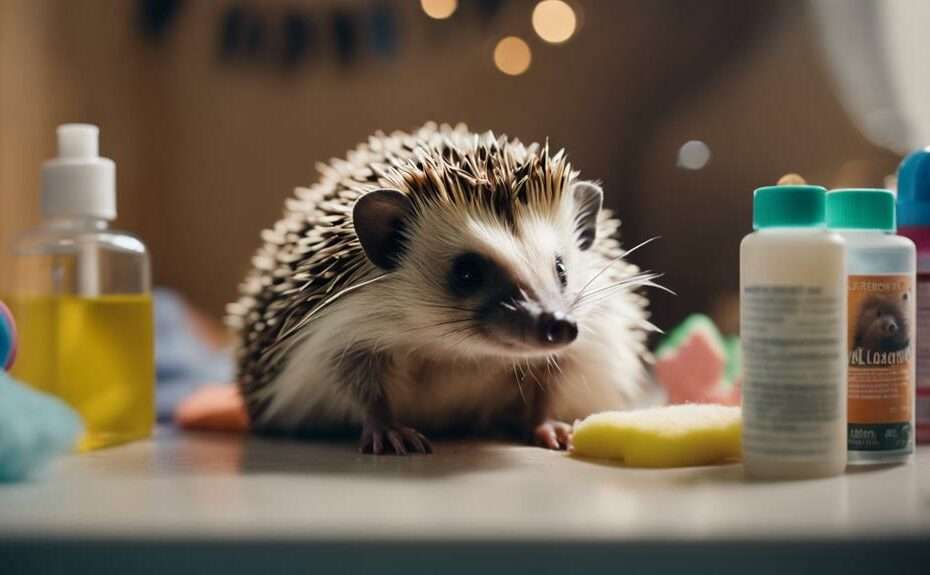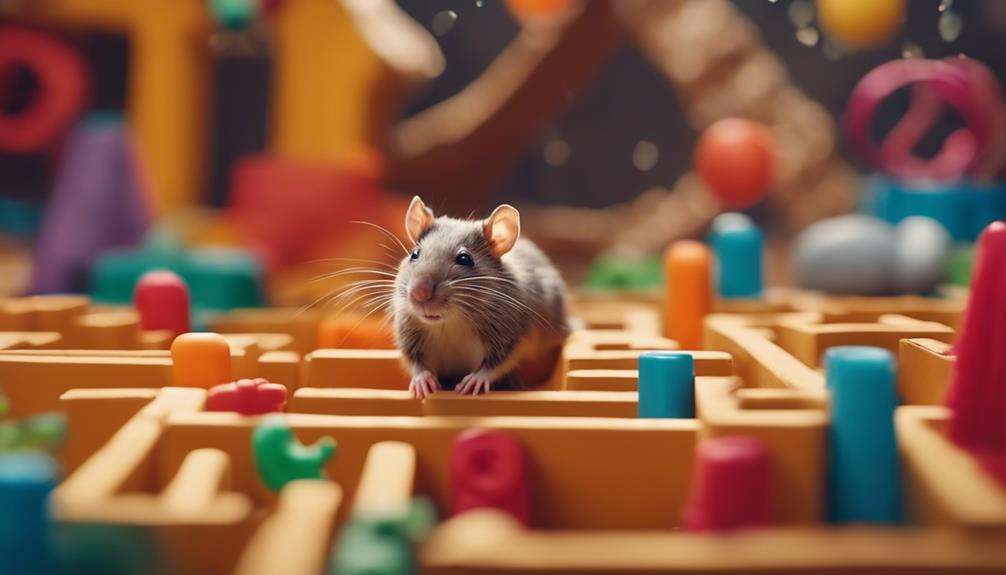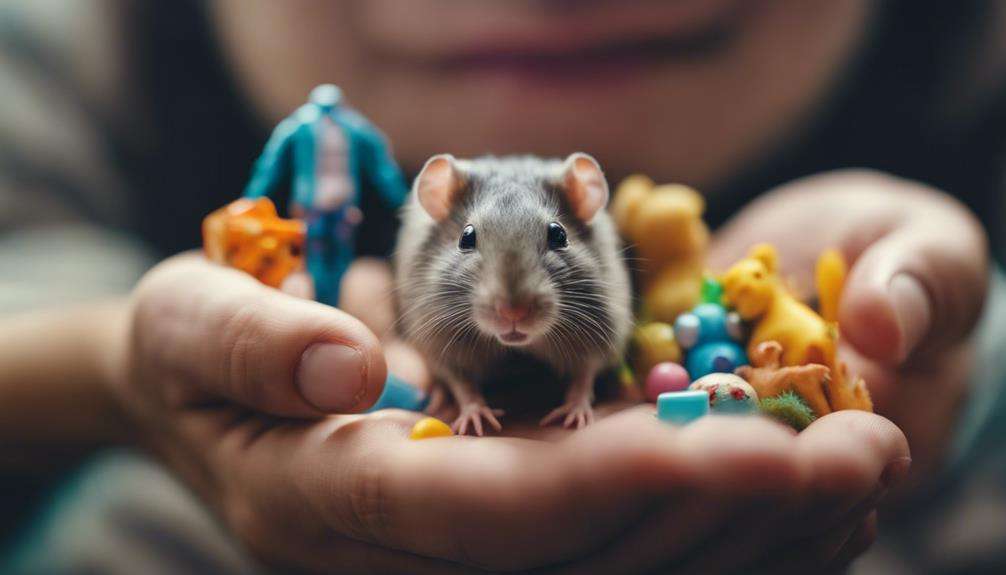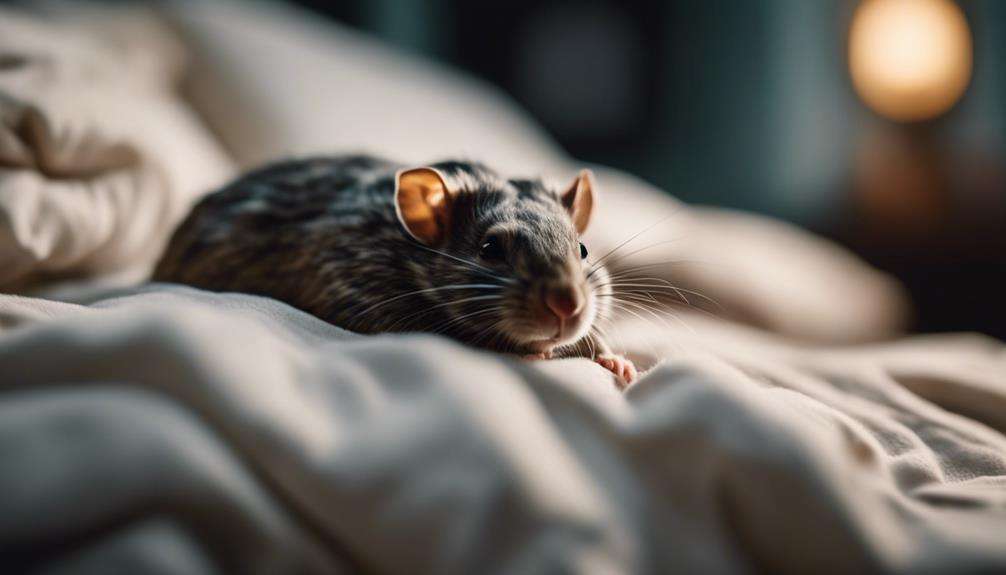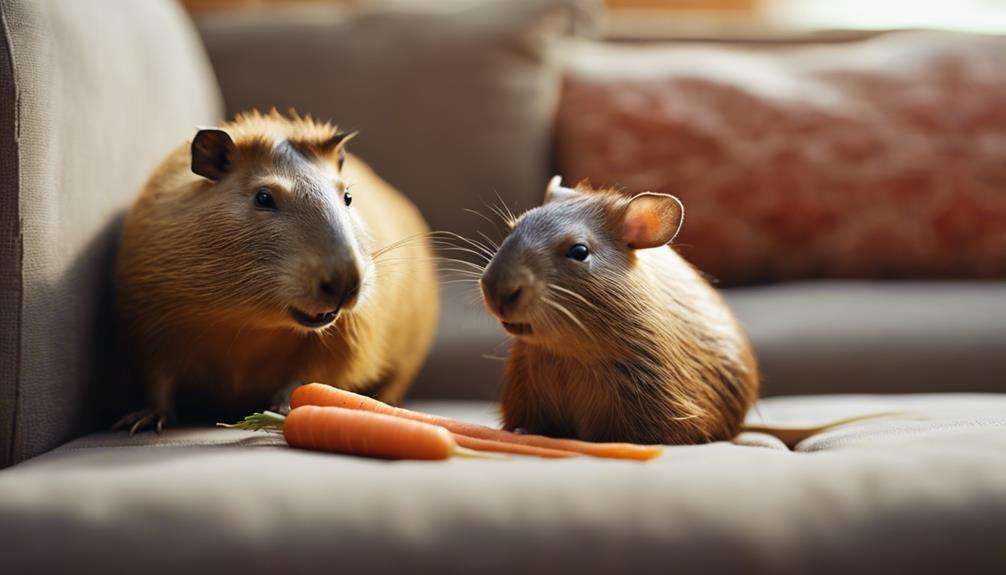You may not realize it, but preventing allergies in exotic pet rodents can be simpler than you think. By implementing a few key strategies, you can create a healthier environment for both you and your furry friend.
From choosing the right bedding to understanding common triggers, these tips can make a significant difference in your pet rodent's well-being.
So, are you ready to take the first step towards a sneeze-free bond with your exotic pet?
Key Takeaways
- Consult with an allergist to identify specific allergens for personalized management.
- Maintain proper cage hygiene with regular cleaning and ventilation to control allergens.
- Choose hypoallergenic bedding and implement dust-free options to reduce airborne particles.
- Use allergy-safe cleaning practices, like non-toxic products and HEPA filters, to minimize allergen exposure.
Exotic Pet Rodents Allergies Overview
Exotic pet rodents, such as mice, hamsters, rats, and gerbils, can provoke pet dander allergies in susceptible individuals. These small creatures are known to produce allergens in their waste, which can lead to allergic reactions in those sensitive to pet dander. While children with mild allergies may tolerate small rodents due to their size and confined environments, allergies to rodents are still possible. In some cases, pollen allergies can also be triggered by the food and bedding of these exotic pets.
To prevent allergic reactions to exotic pet rodents, it's essential to maintain a clean environment. Regularly cleaning cages and the surrounding areas where the rodents roam can significantly reduce the presence of allergens. Proper ventilation and air filtration can also help minimize the spread of allergens. Additionally, washing your hands after handling your pet rodent and avoiding contact with your face can further prevent allergic reactions. By taking these precautions, you can enjoy the companionship of exotic pet rodents without compromising your health.
Understanding Rodent Allergy Triggers
Understanding the triggers of rodent allergies involves recognizing the proteins found in rodent saliva, urine, and dander as common culprits. These pet allergens can lead to allergic reactions in sensitive individuals, presenting as symptoms like sneezing, itchy eyes, coughing, and skin rashes.
In addition to these primary sources of allergens, rodent bedding materials, food, and feces can also contain substances that exacerbate symptoms. To minimize allergen exposure and prevent allergic reactions, it's crucial to practice proper hygiene and ventilation in rodent care.
Here are some key points to consider:
- Identify specific rodent allergens through consultation with an allergist.
- Develop a personalized allergy management plan tailored to your pet and living environment.
- Clean rodent cages regularly to reduce the buildup of allergens.
- Wash your hands after handling rodents or cleaning their living spaces.
- Ensure proper ventilation in the area where the rodents are kept to minimize allergen concentration.
Proper Rodent Cage Hygiene
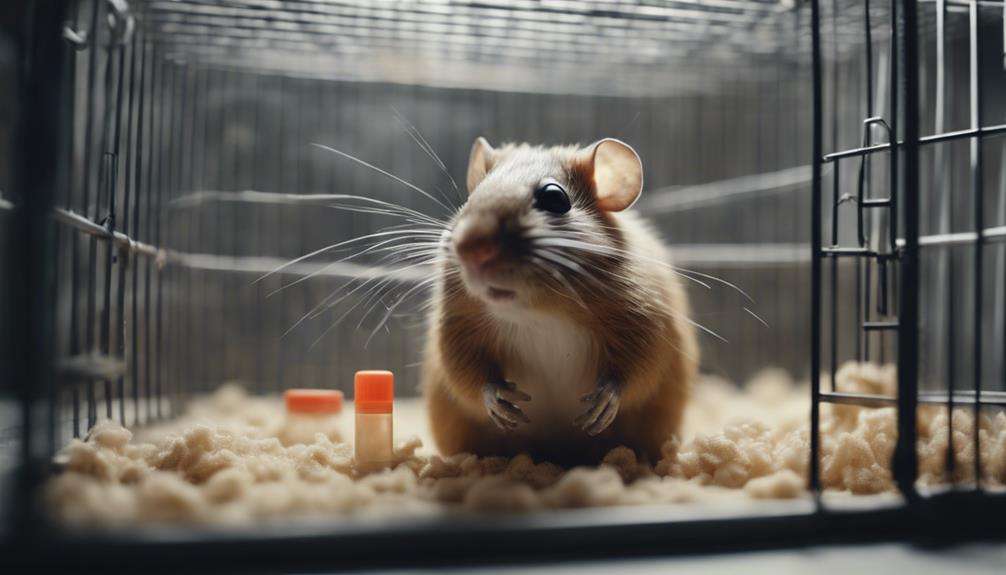
Maintain proper hygiene in your rodent cage by cleaning it at least once a week to eliminate allergens such as dander and urine. Use pet-safe cleaning products to prevent respiratory issues that could arise from harsh chemicals. Promptly remove any soiled bedding and food to ensure a clean environment for your pet rodent. Additionally, regularly washing and disinfecting cage accessories like toys, wheels, and water bottles can help reduce allergen buildup, promoting a healthier living space for your furry friend.
Proper ventilation within the rodent cage is crucial in minimizing allergens. Good airflow can prevent the accumulation of dust, dander, and ammonia from urine, which are common triggers for allergies in pet rodents. Consider placing the cage in a well-ventilated area and ensure there are no obstructions blocking the airflow. By maintaining cleanliness and ensuring adequate ventilation, you can create a comfortable and allergy-friendly environment for your beloved pet rodent.
Rodent Allergy-Friendly Bedding Options
When selecting bedding for your exotic pet rodents, opt for materials like recycled paper or aspen wood shavings to minimize allergens.
Avoid cedar or pine bedding due to the aromatic oils that can trigger allergies in sensitive individuals.
Choose dust-free options to decrease airborne particles that could worsen rodent allergies.
Bedding Material Types
Wondering which bedding materials are best for exotic pet rodents with allergies? When choosing bedding for your exotic pet rodents, opt for hypoallergenic options to minimize allergen exposure. Consider the following allergy-friendly bedding materials:
- Aspen shavings: Known for being hypoallergenic and safe for exotic pet rodents.
- Paper-based bedding: Ideal for sensitive rodents as it's dust-free and reduces allergen exposure.
- Recycled paper products: Offer a hypoallergenic and eco-friendly bedding option for your pets.
- Avoid cedar and pine bedding: These materials can release aromatic oils that may trigger allergies.
- Chemical-free and dust-free bedding: Ensure the bedding is free from chemicals and additives to prevent allergic reactions.
Maintaining a clean and hypoallergenic environment through regular bedding changes is crucial for preventing allergies in exotic pet rodents.
Allergy Prevention Techniques
To minimize allergen exposure in exotic pet rodents, prioritize using bedding materials such as aspen shavings, paper-based bedding, or fleece liners that are known to be allergy-friendly. These options help reduce dander and dust that could trigger allergies in sensitive individuals.
Avoid cedar and pine bedding since they can release aromatic oils that may exacerbate allergic reactions. Regularly cleaning and replacing bedding is crucial to prevent allergen buildup and maintain a healthier environment for your pet rodents.
Consider opting for hypoallergenic bedding materials like recycled paper or natural fibers to further minimize allergic reactions in rodent owners. For personalized advice on selecting the most suitable bedding for your pet rodents to prevent allergies, consult with a veterinarian or allergist.
Managing Rodent Dander and Fur

To effectively manage rodent dander and fur, ensure you regularly clean and sanitize their cages, opting for low-dust bedding materials and maintaining proper ventilation.
Remember to wash your hands thoroughly after handling your rodents to remove any dander particles and consider using air purifiers with HEPA filters in the room to reduce airborne allergens.
These practices can help minimize allergic reactions and create a healthier environment for both you and your exotic pet rodents.
Dander Control Techniques
Regularly cleaning and dusting the cages of exotic pet rodents is essential for managing rodent dander and fur to prevent allergies in sensitive individuals. To control rodent dander effectively and reduce allergic reactions, consider the following techniques:
- Use a HEPA filter in the room where the rodents are kept to trap airborne dander particles.
- Wash your hands thoroughly after handling rodents to minimize dander transfer.
- Maintain proper ventilation in the living space of rodents to reduce dander accumulation.
- Clean cages and surrounding areas frequently to remove dander buildup.
- Consider using a vacuum with a HEPA filter to clean up any loose fur or dander in the environment.
Fur Shedding Management
Managing rodent dander and fur shedding in exotic pet rodents requires consistent grooming and environmental maintenance to minimize allergen exposure and prevent allergic reactions in sensitive individuals.
Regular grooming sessions for your pet rodents can help control the amount of dander and fur they shed. Cleaning their cages frequently and using a HEPA-filtered vacuum to remove any loose particles from the environment is essential. Additionally, providing a well-ventilated living space for your rodents can help reduce airborne allergens.
Consider using allergen-proof covers on cages and bedding to minimize exposure to rodent dander and fur. These proactive measures can significantly decrease the risk of allergic reactions and ensure a healthier environment for both you and your exotic pet rodents.
Rodent Allergy-Safe Cleaning Practices
For optimal rodent allergy-safe cleaning practices, prioritize using non-toxic, fragrance-free cleaning products. When maintaining a clean environment for your exotic pet rodents, consider the following tips to minimize exposure to allergens:
- Clean rodent cages and accessories in a well-ventilated area to prevent allergen buildup.
- Wear a mask and gloves while cleaning to avoid direct contact with allergens that may trigger an allergic reaction.
- Wash your hands thoroughly after handling rodents or cleaning their living spaces to remove allergens and prevent potential allergic symptoms.
- Implement a regular cleaning schedule for cages, bedding, and toys to ensure a consistently allergen-free environment.
- Consider using hypoallergenic cleaners or natural alternatives to reduce the risk of pet allergies and maintain a safe and healthy space for both you and your exotic pets.
Dietary Considerations for Allergy Prevention

To prevent allergies in exotic pet rodents, ensure their diet is rich in essential nutrients that support their immune system and overall health. Rodents like mice, hamsters, and gerbils can trigger pet dander allergies due to proteins in their urine, saliva, and skin cells.
When considering dietary options, focus on providing a balanced diet that excludes common allergens like nuts, dairy, and specific grains that can increase the risk of allergen exposure. Opt for commercial rodent food that's formulated to meet their nutritional needs and avoid potential allergens.
Regularly cleaning and sanitizing the rodents' living environment, including cages, bedding, and accessories, is crucial in minimizing allergen buildup and preventing allergic reactions. Consulting with a veterinarian will help you establish specific dietary considerations tailored to your rodent's needs and provide guidance on effective allergen management strategies to reduce the risk of pet dander allergies in your exotic pets.
Seeking Veterinary Guidance for Allergies
For expert guidance on managing allergies in exotic pet rodents, seeking veterinary advice is crucial to pinpoint specific triggers and determine optimal treatment options for your furry companions. A veterinarian specializing in exotic pets can provide the necessary expertise to ensure the well-being of your pet rodents. Here are some key reasons why seeking veterinary guidance for allergies is essential:
- Allergy Testing: Vets can conduct specific allergy tests to identify the exact triggers causing reactions in your exotic pet rodents.
- Tailored Treatment: Professional advice enables the customization of treatment plans to address the unique allergy needs of your pet rodents.
- Monitoring: Regular check-ups with a vet allow for the tracking of progress and adjustment of management strategies as needed.
- Wellness Maintenance: Veterinary guidance ensures that your exotic pet rodents receive appropriate care to maintain their overall health and quality of life.
- Preventive Care: Vets can offer preventive measures and tips to help minimize the occurrence and impact of allergies on your pet rodents.
Frequently Asked Questions
How Do You Get Rid of Rodent Allergies?
To get rid of rodent allergies, consult with allergists for personalized advice. Consider allergy testing for specific triggers. Implement environmental controls like HEPA filters and clean cages regularly. Address respiratory symptoms promptly. Your health matters.
How Do You Build Immunity to Pet Allergies?
To build immunity to pet allergies, start by gradually exposing yourself to pet allergens. Regular contact helps your immune system adjust, building tolerance over time. Consistent exposure to rodents can reduce allergic reactions and increase allergen tolerance.
How Do You Prevent Pet Allergies?
To prevent pet allergies, control pet dander by cleaning cages regularly, using allergy-friendly rodents, hypoallergenic bedding, and an air purifier. Wash hands after handling pets and seek advice from an allergist for personalized help.
How Do You Neutralize Pet Allergens?
Neutralize pet allergens by using allergen-neutralizing sprays, washing bedding in hot water, vacuuming with HEPA filters, and investing in air purifiers. Consider hypoallergenic fabrics and furniture covers for an allergen-free environment.
Conclusion
In conclusion, preventing allergies in exotic pet rodents requires diligence and attention to detail.
Just like a skilled gardener tends to their plants, so must you tend to your pet rodent's environment to keep allergens at bay.
By following the tips outlined in this article, you can create a safe and comfortable space for both your pet and yourself, free from the pesky irritants that trigger allergic reactions.
